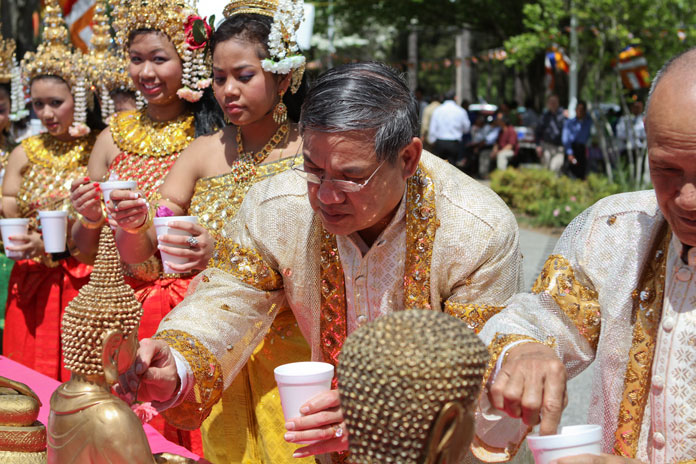Working With Cambodia's Numerous Official Public Holidays
By
B2B Cambodia
on
 This year, Cambodian workers will enjoy a grand total of 27 days off as a result of public holidays. DHLEONARDCONSULTING.COM
Like it or not, Cambodia is one of the most festive places on Earth, with over two dozen public holidays every year. In 2017, workers across the Kingdom will officially enjoy a total of 27 days off as a result of public breaks. Compare this to Thailand, where national holidays this year amount to 20, or Vietnam, where employees will only have around 15 days off work.
The traditional Khmer calendar is lunisolar, which means that, while based on the phases of the moon, the dates are also synchronised with the solar year to keep the seasons from drifting. The dates of the festivals, and therefore holidays, in Cambodia are subject to change every year, although the major ones such as Khmer New Year cover multiple days so fluctuations are less noticeable. Most Buddhist holidays coincide with full moons.
This year, Cambodian workers will enjoy a grand total of 27 days off as a result of public holidays. DHLEONARDCONSULTING.COM
Like it or not, Cambodia is one of the most festive places on Earth, with over two dozen public holidays every year. In 2017, workers across the Kingdom will officially enjoy a total of 27 days off as a result of public breaks. Compare this to Thailand, where national holidays this year amount to 20, or Vietnam, where employees will only have around 15 days off work.
The traditional Khmer calendar is lunisolar, which means that, while based on the phases of the moon, the dates are also synchronised with the solar year to keep the seasons from drifting. The dates of the festivals, and therefore holidays, in Cambodia are subject to change every year, although the major ones such as Khmer New Year cover multiple days so fluctuations are less noticeable. Most Buddhist holidays coincide with full moons.
 Khmer New Year falls on 14-16 April this year.
In the fourth quarter of each year, the Cambodian government issues a sub-decree signed by Prime Minister Hun Sen outlining the official holidays for the following year. This list is then used by the Ministry of Labour to form a prakas (proclamation), which is sent out to all registered members in various industries. Below, you’ll find the official public holiday calendar for 2017, as stipulated by Prakas No. 466 and by Sub Decree No. 223.
Khmer New Year falls on 14-16 April this year.
In the fourth quarter of each year, the Cambodian government issues a sub-decree signed by Prime Minister Hun Sen outlining the official holidays for the following year. This list is then used by the Ministry of Labour to form a prakas (proclamation), which is sent out to all registered members in various industries. Below, you’ll find the official public holiday calendar for 2017, as stipulated by Prakas No. 466 and by Sub Decree No. 223.
- 1 January - International New Year’s Day (1 day off)
- 7 January - Victory Over Genocide Day (1 day off)
- 11 February - Meak Bochea Day (1 day off)
- 8 March - International Women’s Day (1 day off)
- 14-16 April - Khmer New Year (3 days off)
- 1 May - International Labour Day (1 day off)
- 10 May - Visak Bochea Day (1 day off)
- 13-15 May - King Norodom Sihamoni’s Birthday (3 days off)
- 14 May - Royal Plowing Ceremony (1 day off)
- 1 June - International Children’s Day (1 day off)
- 18 June - Queen Norodom Monineath Sihanouk’s Birthday (1 day off)
- 19-21 September - Pchum Ben (3 days off)
- 24 September - Constitutional Day (1 day off)
- 15 October - Commemoration Day of Former King Norodom Sihanouk (1 day off)
- 23 October - Anniversary of the Paris Peace Accord (1 day off)
- 29 October - King Norodom Sihakmoni’s Coronation Day (1 day off)
- 2-4 November - Water Festival (3 days off)
- 9 November - Independence Day (1 day off)
- 10 December - International Human Rights Day (1 day off)